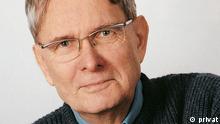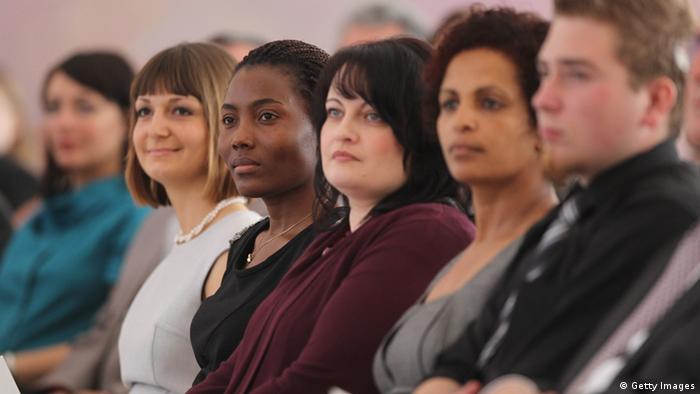Studies show that increasing numbers of highly skilled immigrants are coming to Germany. They face a number of hurdles, but there are positive signs in the country's changing attitudes toward them.
"So, how'd you learn to speak German so well?" - It's a question journalist and TV moderator Elif Senel hears all the time, despite being born in Germany.
"However," she said, "I've noticed a difference between generations: Only older people ask that because for younger Germans, it's totally normal that someone with a non-German sounding name is still German."
Senel's parents moved to Germany from the Turkish region of Anatolia in the 1970s, and her father was among the so-called guest workers who were recruited for manual labor beginning in the 1950s.
After German reunification, many members of German minority groups who lived abroad sought repatriation in Germany. And in the first decade of the 21st century, many highly qualified immigrants have entered Germany: in 2009, 21 percent of the newcomers had a highly specialized skill set and job, according to a study by the Cologne-based Institute for Economic Research.
"Since increasing numbers of highly-qualified people are coming to Germany, the image of the educated immigrant is beginning to overshadow the picture of the unskilled laborer," said immigration expert Klaus Bade, who led the Expert Council of German Foundations on Integration and Migration (SVR) until July 1.
A positive picture - with a few exceptions
"However," she said, "I've noticed a difference between generations: Only older people ask that because for younger Germans, it's totally normal that someone with a non-German sounding name is still German."
Senel's parents moved to Germany from the Turkish region of Anatolia in the 1970s, and her father was among the so-called guest workers who were recruited for manual labor beginning in the 1950s.
After German reunification, many members of German minority groups who lived abroad sought repatriation in Germany. And in the first decade of the 21st century, many highly qualified immigrants have entered Germany: in 2009, 21 percent of the newcomers had a highly specialized skill set and job, according to a study by the Cologne-based Institute for Economic Research.
"Since increasing numbers of highly-qualified people are coming to Germany, the image of the educated immigrant is beginning to overshadow the picture of the unskilled laborer," said immigration expert Klaus Bade, who led the Expert Council of German Foundations on Integration and Migration (SVR) until July 1.
A positive picture - with a few exceptions
 Klaus Bade criticizes German attitudes toward Muslims
Klaus Bade criticizes German attitudes toward Muslims
"In general, the picture for immigrants has changed for the better - with the exception of a few groups," said Klaus Bade, who notes that there has been a long list of migrant groups targeted as problematic. "In the 50s, it was the Italians, who were supposedly chasing German girls, and in the 80s and 90s, it was the idea of criminals from Eastern Europe, and today, it's primarily the Roma from non-EU states like Romania and Bulgaria, who come to Germany."
Bade adds that public resentment toward the Roma leads "to a distorted picture of Romanians and Bulgarians," despite the fact that many well-qualified individuals from these countries seek to move to Germany.
Muslims represent a second exception to the increasingly positive picture of immigration Germans have, criticizes Bade. "Publications like the book 'Deutschland schafft sich ab' (Germany Does Away with Itself) by Thilo Sarrazin shore up anti-Islamic agitation by claiming that Muslims are dangerous and tend to be fundamentalists," he said.
Elements of the debate about Sarrazin's controversial book, which derides integration attempts as a failure, are reflected in the results of the Immigration Barometer, an annual report by SVR.
"At the end of 2009 - before the debate - most people both with and without roots in other countries agreed that Germans and immigrant groups coexist well," Bade said. "Just a year later we've seen a clear retreat of optimism about integration - from both sides."
However, that trend has also been reversed in the meantime - a result that Bade interprets as showing how volatile views on immigration and integration are.
The results also suggest that Germans and immigrant residents in the country have similar beliefs on the topic of immigration. 60 percent of both groups agree that more highly-qualified people should move to Germany, and 70 percent of both groups want to do more to encourage successful integration.
Bade adds that public resentment toward the Roma leads "to a distorted picture of Romanians and Bulgarians," despite the fact that many well-qualified individuals from these countries seek to move to Germany.
Muslims represent a second exception to the increasingly positive picture of immigration Germans have, criticizes Bade. "Publications like the book 'Deutschland schafft sich ab' (Germany Does Away with Itself) by Thilo Sarrazin shore up anti-Islamic agitation by claiming that Muslims are dangerous and tend to be fundamentalists," he said.
Elements of the debate about Sarrazin's controversial book, which derides integration attempts as a failure, are reflected in the results of the Immigration Barometer, an annual report by SVR.
"At the end of 2009 - before the debate - most people both with and without roots in other countries agreed that Germans and immigrant groups coexist well," Bade said. "Just a year later we've seen a clear retreat of optimism about integration - from both sides."
However, that trend has also been reversed in the meantime - a result that Bade interprets as showing how volatile views on immigration and integration are.
The results also suggest that Germans and immigrant residents in the country have similar beliefs on the topic of immigration. 60 percent of both groups agree that more highly-qualified people should move to Germany, and 70 percent of both groups want to do more to encourage successful integration.
No need to hide
 Journalist Elif Senel sees an improving situation for immigrants
Journalist Elif Senel sees an improving situation for immigrants
Germans in everyday life as well as in politics and the media often distinguish sharply between people they see as native to Germany and people who are immigrants or from immigrant families - and that's a problem, says immigration researcher Paul Mecheril.
"In order to create a truly welcoming culture in Germany, it's necessary to accept more readily that people of various backgrounds and with varying appearances live here," said the intercultural expert and professor at the University of Oldenburg, who stresses that even German terminology relating to immigration focuses too much on foreignness.
Journalist Elif Senel has seen signs of a shift in relating to people with non-German roots simply by watching German television. "In TV series and soap operas, there's often an Iranian doctor, say, or a Turkish real estate broker - without these people's background coming up as an issue at all."
All in all, Senel believes that Germany has taken significant steps on immigration issues in the last decade and that the image of newcomers has improved.
"That's also thanks to the fact that immigrants now present themselves with more confidence. My parents and many other guest workers used to want to be as inconspicuous as possible. They were simply grateful to be allowed to live here at all," recalled the TV moderator. "But when there's too much humility and gratitude, it stops you from contributing to the society and helping to shape it actively. Those who present themselves in a confident way will often earn more respect." dw de
"In order to create a truly welcoming culture in Germany, it's necessary to accept more readily that people of various backgrounds and with varying appearances live here," said the intercultural expert and professor at the University of Oldenburg, who stresses that even German terminology relating to immigration focuses too much on foreignness.
Journalist Elif Senel has seen signs of a shift in relating to people with non-German roots simply by watching German television. "In TV series and soap operas, there's often an Iranian doctor, say, or a Turkish real estate broker - without these people's background coming up as an issue at all."
All in all, Senel believes that Germany has taken significant steps on immigration issues in the last decade and that the image of newcomers has improved.
"That's also thanks to the fact that immigrants now present themselves with more confidence. My parents and many other guest workers used to want to be as inconspicuous as possible. They were simply grateful to be allowed to live here at all," recalled the TV moderator. "But when there's too much humility and gratitude, it stops you from contributing to the society and helping to shape it actively. Those who present themselves in a confident way will often earn more respect." dw de


No comments:
Post a Comment